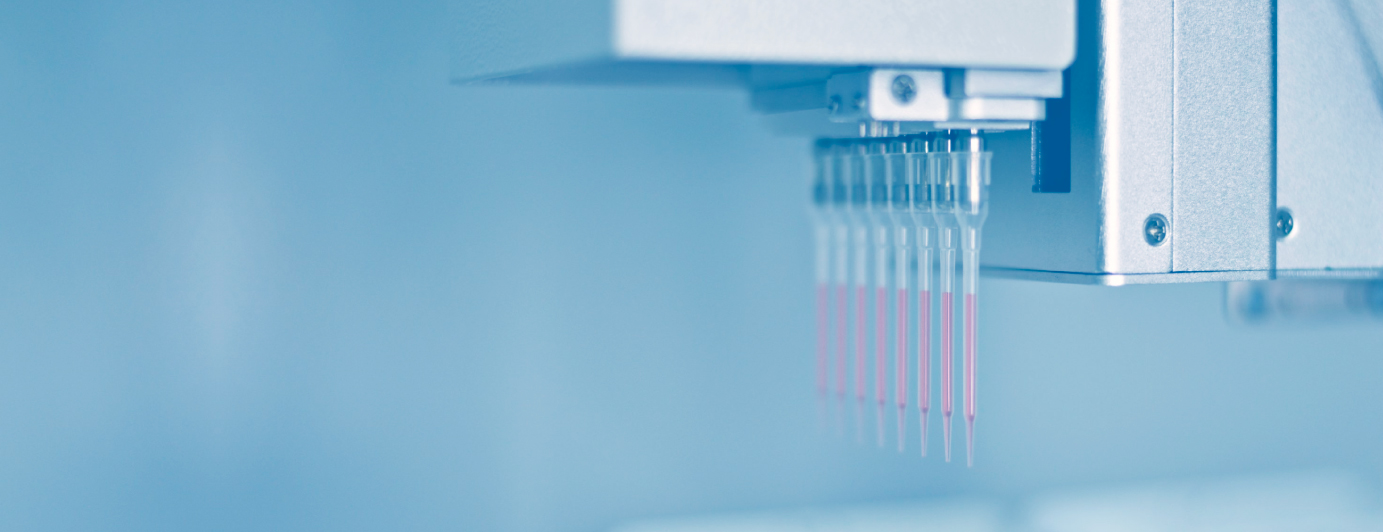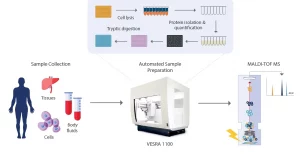Rapid and accurate diagnosis is a cornerstone of providing quality patient care in modern medicine. Among the various diagnostic techniques available, Matrix-Assisted Laser Desorption/Ionization Time-of-Flight Mass Spectrometry (MALDI-TOF MS) has revolutionized clinical diagnostics. This advanced technology can rapidly analyze biomolecules based on their mass-to-charge ratios, leading to diverse applications that span microbial identification, disease diagnosis, and personalized medicine. To harness the full potential of MALDI-TOF MS, the automation of sample preparation has become imperative. In this blog post, we will explore the significance of MALDI-TOF MS in clinical diagnosis and dive into why automating its sample preparation is a crucial step forward.
One of the hallmark applications of MALDI-TOF MS in clinical diagnosis is microbial identification and characterization. This technique enables rapid and accurate identification of microorganisms by creating a unique “fingerprint” for microbial cells or components through ionization and mass analysis. Compared to traditional culture-based methods, this revolutionary approach has revolutionized microbiology laboratories. MALDI-TOF MS’s ability to differentiate between species and strains at a remarkable pace has streamlined the identification of bacterial, fungal, and viral pathogens. Its role in detecting infectious agents, determining antibiotic resistance profiles, and guiding appropriate treatment choices has transformed patient care and contributed to the global fight against antimicrobial resistance.
MALDI-TOF MS’s impact transcends microbial identification, extending into the realm of disease diagnosis and biomarker discovery. The technique’s high-throughput nature allows researchers to analyze complex mixtures of proteins and other biomolecules present in patient samples. This has proven particularly valuable in identifying disease-specific biomarkers associated with various medical conditions, including cancers, cardiovascular diseases, and neurodegenerative disorders. MALDI-TOF MS’s precision and sensitivity have facilitated the early detection of diseases, enabling timely interventions and personalized treatment strategies.
The marriage of MALDI-TOF MS with clinical proteomics has yielded significant advancements in personalized medicine. Clinicians gain insights into individual variations and disease states through detailed analyses of protein profiles in patient samples. This knowledge guides treatment decisions, helping tailor therapies to a patient’s unique molecular profile. In the era of precision medicine, MALDI-TOF MS has emerged as a key player in optimizing therapeutic approaches, minimizing adverse effects, and enhancing treatment outcomes.
Traditionally, MALDI-TOF MS sample preparation has been a manual and labor-intensive process. It involves several critical steps, such as matrix application, analyte mixing, and spotting onto the target plate. Manual sample preparation can be time-consuming, prone to human errors, and may lead to inconsistent results due to variations in technique. Moreover, the delicate nature of biological samples requires precise handling to ensure accurate and reproducible results.
Aurora’s VERSA workstation is revolutionizing the process of MALDI-TOF MS sample preparation. It is designed to perform various sample preparation steps with high precision and efficiency, greatly reducing the human intervention required. Also, it can handle multiple samples simultaneously and eliminate the variability associated with manual sample preparation, resulting in highly reproducible data. This consistency is crucial for obtaining reliable qualitative and quantitative analysis results. Moreover, it significantly reduces the time required for sample preparation. Researchers can now process multiple samples simultaneously, allowing for high-throughput analyses that expedite research workflows. Automation mitigates the risk of human errors introduced during manual sample preparation. This improves data quality, especially in longitudinal studies where consistency is paramount. By automating repetitive and time-consuming tasks, researchers can allocate their expertise to more critical aspects of the research, such as data analysis and interpretation.




